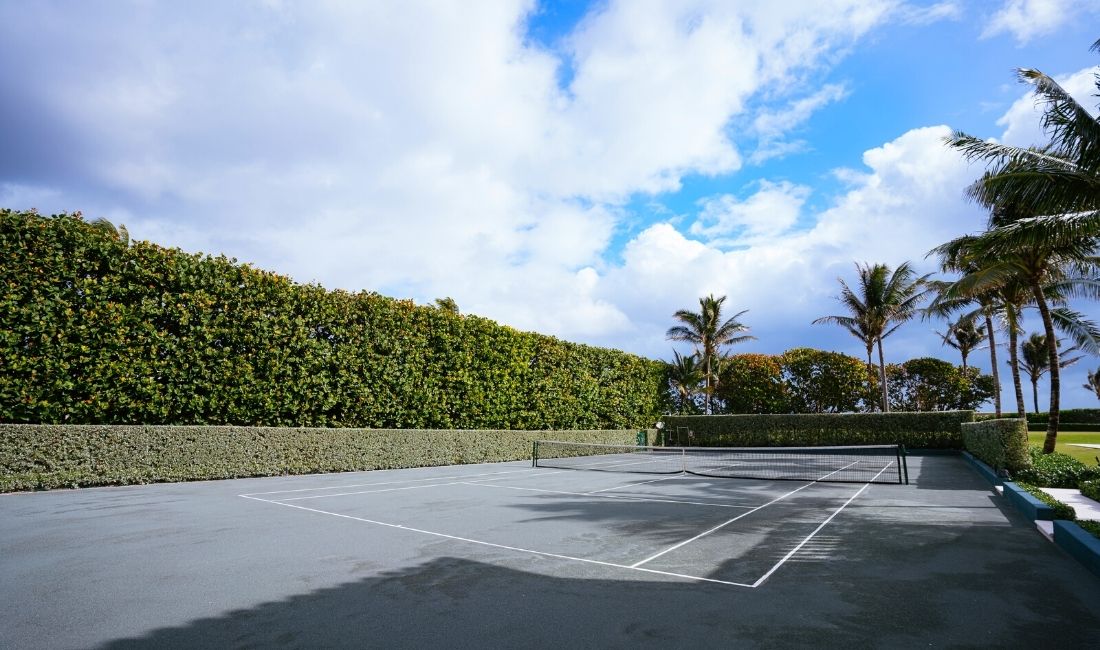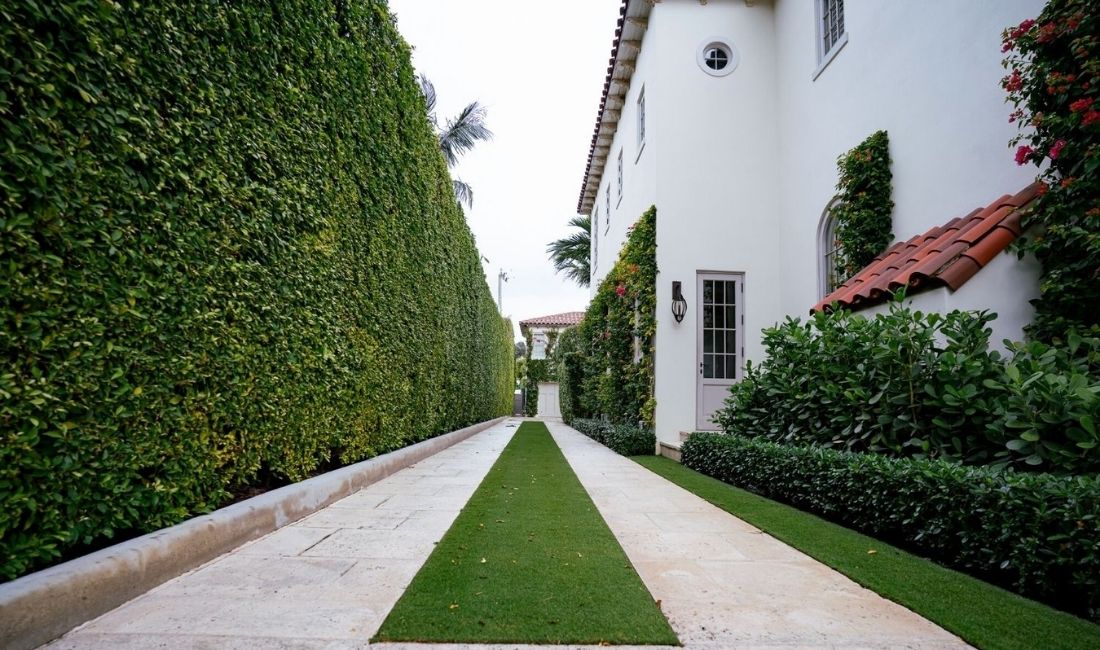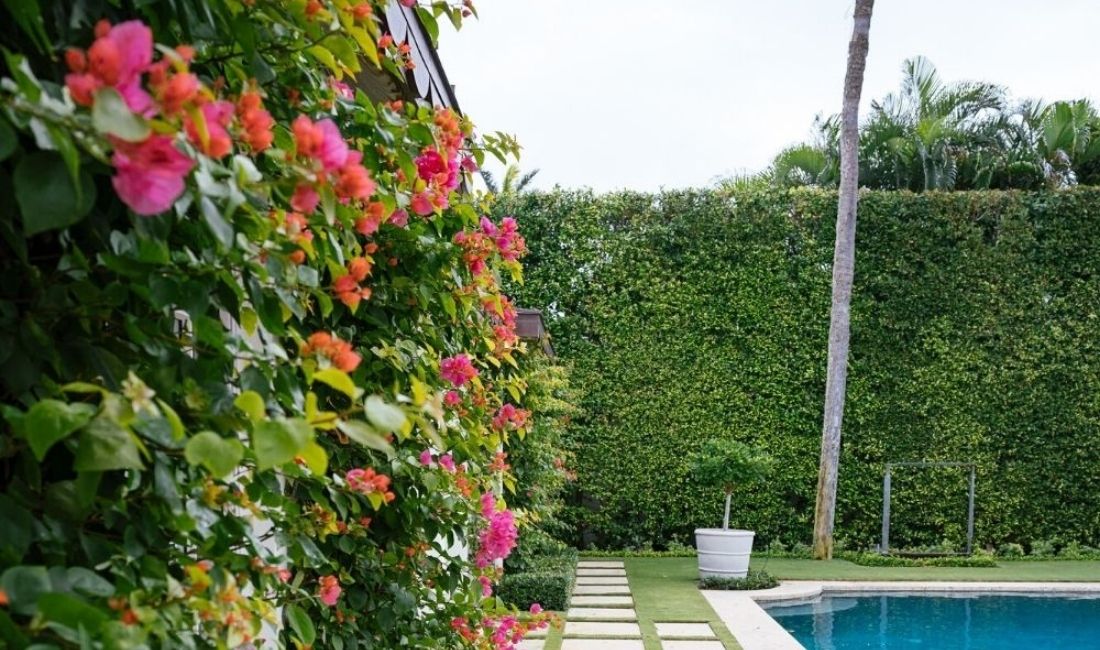“Good fences make good neighbors” – Robert Frost
Many Palm Beach residents find that they need additional screening to provide privacy throughout their property. Homes that are sited close to neighbors may benefit from a privacy hedge. Those near the beach may want something to cut down on blowing sand and curious passers-by. Whatever the reason, there’s a way to create privacy that will give you both the seclusion and aesthetic appeal you desire (and that doesn’t always involve putting up fences!). Keep reading for details on how to create privacy for your outdoor spaces.

What to Consider Before Creating Outdoor Privacy
Creating the best outdoor privacy for your property requires careful planning from the onset. At this early stage, there are three essential considerations, regardless of what outdoor privacy plants or other garden elements you hope to use:
- Local weather conditions
- Why you need or want privacy
- How to create privacy in moderation
Each of these factors will play a significant role in how you create privacy for your Palm Beach property. By taking time to study them, you’ll be better able to create the peaceful outdoor oasis of your dreams.
Understand Local Weather Conditions
As is the case with just about any outdoor project, local weather conditions will have a strong influence on how you create privacy for your outdoor spaces. For instance, a unique set of weather conditions will impact any landscape design project that takes place in a location close to the ocean, such as Palm Beach.
Living close to the ocean certainly has its perks. But being beachfront also presents some challenges when planning a private outdoor area. Most notably, the structures and privacy plants you use will need to withstand:
- strong winds,
- sandy soils, and
- salt spray.
The strong winds from the ocean can alter the foliage and growth habits of plants that have no protection through a process called wind pruning. Over time, those plants may no longer provide the screening you want. You’ll also need to make sure that the plants you choose can survive in the sandy soils near the ocean. Likewise, you’ll want to be careful in selecting the fences and other privacy structures for your property as materials like unprotected metal can quickly rust in the face of constant salt spray.
Understand Why You Need Outdoor Privacy
This point may seem obvious, but it is vital to have a clear idea of why you need privacy in the first place. No two properties are identical, which means each one will need a different degree of privacy.
Take time to study the area around the space you wish to make private. What are you trying to block out? What directions do people see you from? Do you need screening from above?
Making it more difficult for people off your property to look in is the most common reason to create more privacy in your yard, but there are other reasons to do so as well.
Perhaps you have neighbors nearby and you’d like to screen the sightlines between your properties. In other cases, you may want to create a visual barrier between your yard and a nearby beach.
Many people fail to think about creating privacy within their property. In those scenarios, you may set up your privacy to block views from your home or other areas of your yard.
The reason that you choose to enhance the privacy of your outdoor areas may vary. But what is most crucial is understanding what that reason is. Once you know that, you’re one step closer to designing a secluded outdoor space that will meet all your needs.
Understand How to Create Privacy in Moderation
It’s easy to overdo it when adding plants and structures to create privacy. However, if you are too heavy-handed with how you block the noise and views that enter your yard, you’ll end up making a space that is too claustrophobic to be enjoyable. That’s where moderation comes into play.
Use the Right Proportions
The goal is to create privacy without ruining the beauty of your outdoor space. The best way to do that is by installing privacy screening in the right proportions. For example, think about the length and width of your garden space in relation to the height of your hedge or fence. A privacy element that is too tall for the space it encloses will make the area feel constrained.
Plan for the Mature Size of Plants
While it can be tempting to use large and tall outdoor plants for privacy, make sure they’ll work with the size of your outdoor space when they’re fully mature. It’s best to select a privacy screen hedge plant that will give you seclusion without needing constant trimming to keep it in bounds or making you feel boxed in.

Three Different Ways to Create Privacy/Seclusion
Generally, there are three main approaches to making your outdoor spaces more private.
- Add hardscaping elements
- Locate the space to maximize privacy
- Install plants for privacy
Each of those methods has a distinct set of advantages and disadvantages. To find out which one of these privacy tactics is right for you, read on.
Option 1 – Hardscape for Outdoor Privacy
The first way to make your yard more private is by adding hardscape elements. Hardscape comes in various forms, many of which are suitable for adding a greater sense of seclusion to your yard. Some of the best hardscape options for this goal are:
- Walls
- Fences
- Screens
- Lattice
Numerous other types of hardscape can also add privacy to your yard (such as awnings), but the ones above are some of the most popular choices.
Advantages of Hardscape for Outdoor Privacy
There is one main reason you might want to choose a hardscape privacy element over one that relies on plants – hardscaping creates almost immediate privacy while plants can take several years or more to develop. That means you’ll need to wait a while to enjoy the privacy you envision when using plant material. In contrast, when using hardscape elements the privacy you desire will be ready for you to enjoy as soon as the construction process is over.
Disadvantages
We’re all familiar with the constant upkeep required to keep hardscape elements looking their best despite the damage caused by the sun, sand, and salt spray. Metal is most vulnerable unless it’s fully coated (e.g., powder-coated or painted), but wood, plastic, fabric, and even stone can deteriorate in Palm Beach’s oceanside conditions.
Option 2 – Choose the Location of Your Outdoor Space Wisely
There are some cases where you may not need to add any physical structures or plants to give your outdoor spaces more privacy. The way to do that is to be highly strategic when choosing the location of your private space.
This approach works best when planning a new space in your yard, rather than working with an existing space. Consider that there may already be some features on your property that can give you the privacy you want. Look around and notice where there are existing walls, fences, structures, raised areas, or dense vegetation that you can take advantage of. If such features are present, site your outdoor space near them to get privacy right away.
Advantages of Choosing an Existing Location for Privacy
The greatest benefit of this tactic is that you won’t need to spend any additional money on fences or plants once you have built your new outdoor space. You also won’t need to wait for plants to grow or for a construction crew to install a fence before you can relax in a secluded outdoor space.
Disadvantages
The downside here is that you’ll have less flexibility in choosing the location of your private outdoor space and the materials that create that privacy. However, if you want a quick and affordable way to make a quiet garden gathering area, using the exciting features on your site is an excellent way to start.

Option 3 – Use Plants to Create Outdoor Privacy
Using plants to form a dense privacy hedge is one of the most widespread ways to create seclusion in an attractive way. Despite that popularity, many gardeners and homeowners wonder what the best plant for a privacy hedge is. To help you out with that decision, here are some of the best species to plant for privacy in Palm Beach:
- Conocarpus erectus, green buttonwood
- Elaeocarpus decipiens, Japanese blueberry tree
- Platycladus orientalis, oriental arborvitae
- Laurus nobilis, bay laurel
- Schaefferia frutescens, Florida boxwood
The best plants for privacy hedges typically hold their leaves all year round and have a dense growth habit. The Palm Beach County ordinances state that “Trees, shrubs, and hedges, especially those used for screening and buffering, should display a fullness at maturity that is typical of the species.” So be sure to choose an evergreen species with enough leaves and branches to look lush and full at maturity – and block all unwanted views. But you’ll also want to watch out because some of the best fast-growing hedge and screening plants are also invasive.
There are also many plants that work well in large containers to give you the seclusion you need. Simply place containers where the plants will screen the unwanted views or shield you from prying eyes. This is an excellent choice when combined with Option 2 above to give you almost instant privacy.
Plants can also be used in conjunction with lattice or trellises. Vines, including flowering vines, will grow up and through the structure, creating a blanket of leaves that screens unwanted views.
Advantages of Using Plants for Privacy
Plants create a calming – and cooling – environment in which to relax. With a wide range of colors, shapes, sizes, and flowers, plants can be used to create a beautiful space that’s tailored to your aesthetic preferences and can even change with the seasons.
Disadvantages
Installing large, mature plants for instant privacy is a costly process and, depending on the plants you choose, may not even be possible. Smaller, younger plants will take a while to reach a size and density at which they can provide adequate screening. Plants aren’t maintenance-free; they’ll require irrigation, fertilization, professional pruning, and even pest or disease treatment on occasion. And if one or more plants in a privacy hedge die, it will be difficult to replace them with plants of comparable size.
Avoid Privacy Hedge Plants that Are Invasive or Banned in Palm Beach
Invasive plants spread rapidly, which is why many people have used them to create privacy hedges. However, we now know that these plants harm local ecosystems, sometimes irreparably. Invasive species often outcompete native plants, which leads to a whole host of environmental issues.
For example, Ficus benjamina, a hugely popular privacy hedge plant, is a non-native that’s highly susceptible to whitefly infestations and requires frequent pesticide applications to stay healthy. As a result, Palm Beach has banned the new planting of ficus benjamina or ficus nitida (with the exception of replacement plantings associated with a utility easement).
What’s considered an invasive species depends on where you live. That means it is your responsibility to research which plants are invasive where you live (here are the non-native invasive plants in Palm Beach County, all of which are prohibited from being planted and must be removed if they’re on your property). Avoid planting those species even if you find them attractive. Use native hedge plants or other Florida-friendly species, and you’ll receive the privacy you want without harming our beautiful slice of paradise.
Need Help Creating a Private Outdoor Space?
For any project that involves altering your property, what’s most important is finding a professional team that can get the job done the right way. Coastal Gardens is ready to make your outdoor privacy ideas a reality.
Along with a comprehensive set of landscape-related services, Coastal Gardens also runs a nursery in Palm Beach. There you can find locally-grown plants that look beautiful and thrive in a coastal environment. Included in that nursery are plenty of plant species that are well-suited for creating privacy. However, if you don’t find a species you like, Coastal Gardens can source or grow the plants you want for your design.
Once you settle on your favorite way to create a private outdoor space, the Coastal Gardens team will be ready to bring that space to life. Reach out today to learn more about the many Coastal Garden services that will keep your landscape attractive and enjoyable to use.
CALL US TODAY At 561-308-7604
Estate landscape Services
For Fine Properties in Palm Beach
With Coastal Gardens, you can rest easy knowing that your property is taken care of by a dedicated team of estate landscape professionals who truly care about creating and maintaining a dazzling outdoor space you can be proud of.
